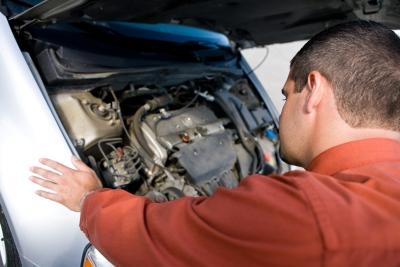
Car batteries can lose their charge for a variety of reasons. However, there are four common problems that can cause a battery to drain slowly. If your battery was running fine the last time you drove and now won't start the car, one of the following problems may be to blame.
If your ignition is turned off but the electrical devices such as your radio presets, security alarms or clocks continue to run, it can drain your battery. This type of drain is called a parasitic drain. Parasitic drains below 75 milliamps are normal, but any parasitic drain over 75 milliamps will drain the battery quickly. The most common causes of parasitic drain are under hood lights, trunk lights, headlights or glove box lights that do not turn off when the door is closed. Relay switches that are stuck in the "on" position can also cause a battery to drain.
A faulty charging system will drain the battery while the car is running. When an alternator is not pushing out enough voltage, which should be between 13.5 and 14.5 volts, the battery will drain quickly. This is especially true if you play the radio and lights while driving. Once the car battery drains completely, the headlights and radio will not operate. The car will stall and not start again until the battery is charged.
Alternators with bad diodes can cause battery drain. An alternator with a good diode allows current to flow in one direction. A bad diode can leak and allow the current to flow in the opposite direction. When this happens, it may keep the charging circuit on after the vehicle engine is shut off, which will cause the battery to drain.
Batteries that are old or have been drained continuously may not hold a full charge anymore. The rule of thumb for replacing a battery is every four to five years. However, some batteries can last years longer if taken care of and not run down while the charging system is not running. Batteries that are allowed to freeze over an extremely cold winter may also have problems holding a charge.